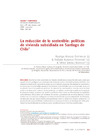Please use this identifier to cite or link to this item:
https://accedacris.ulpgc.es/jspui/handle/10553/114457
| Title: | La reducción de lo sostenible: políticas de vivienda subsidiada en Santiago de Chile | Other Titles: | The reduction of sustainability: subsidized housing policies in Santiago de Chile | Authors: | Hidalgo Dattwyler, Rodrigo Alvarado Peterson, Voltaire Jiménez Barrado, Victor |
UNESCO Clasification: | 332904 Uso del suelo | Keywords: | Neoliberalismo Políticas de sostenibilidad Principios de equidad Subsidios habitacionales Neoliberalism, et al |
Issue Date: | 2018 | Project: | FONDECYT regular de investigación N° 1150360 | Journal: | Ciudad y Territorio: Estudios Territoriales | Abstract: | Uno de los roles esenciales del Estado neoliberal es la gestión del suelo, dado que
a partir de ello configura sus estrategias de bienestar social e inversión privada. En Chile, este
modelo de producción espacial se apoya en una robusta estructura de asignación subsidiaria,
la misma que ha pretendido ajustarse a la idea de sostenibilidad que ha colonizado tanto a la
academia como a las políticas públicas. Lo anterior ha tensionado la relación entre la línea
verde en el desarrollo urbano y la demanda por un hábitat residencial basado en la equidad.
El presente trabajo propone una revisión y análisis crítico sobre las dimensiones de equidad y
sostenibilidad (mesurables en términos de acceso y presencia de servicios básicos y áreas
verdes) con las cuales se configuran los instrumentos fiscales para la adquisición de viviendas.
Se descubre así que la pretendida compatibilidad entre un desarrollo urbano sostenible y la
prestación de nuevos hábitats residenciales en el marco territorial de Santiago de Chile, principal metrópolis del país se presenta como una disyuntiva en términos ambientales. One of the essential roles on the neoliberal State is land management, because from it, the State can configure the strategies of social welfare and private investment. In Chile, this model of spatial production is based on a robust structure of subsidiary assignation: the same that has tried to be adjusted to the idea of sustainability, which has colonized both academia and public policies. So, this has stressed the relationship between the green line in urban development and the demand for a residential habitat based on equity. The present work proposes a critical review and analysis on the dimensions of equity and sustainability (measurable in terms of access and presence of basic services and green areas) which configure the fiscal instruments for the acquisition of housing. This analysis reveals that the alleged compatibility between a sustainable urban development model and the provision of new residential habitats within the territorial framework of Santiago de Chile-the main metropolis of the country- appears as disjunctive in environmental terms. |
URI: | https://accedacris.ulpgc.es/handle/10553/114457 | ISSN: | 1133-4762 | Source: | Ciudad y Territorio: Estudios Territoriales [ISSN 2659-3254], v. 50 (196), p. 293-306 |
| Appears in Collections: | Artículos |
Items in accedaCRIS are protected by copyright, with all rights reserved, unless otherwise indicated.
